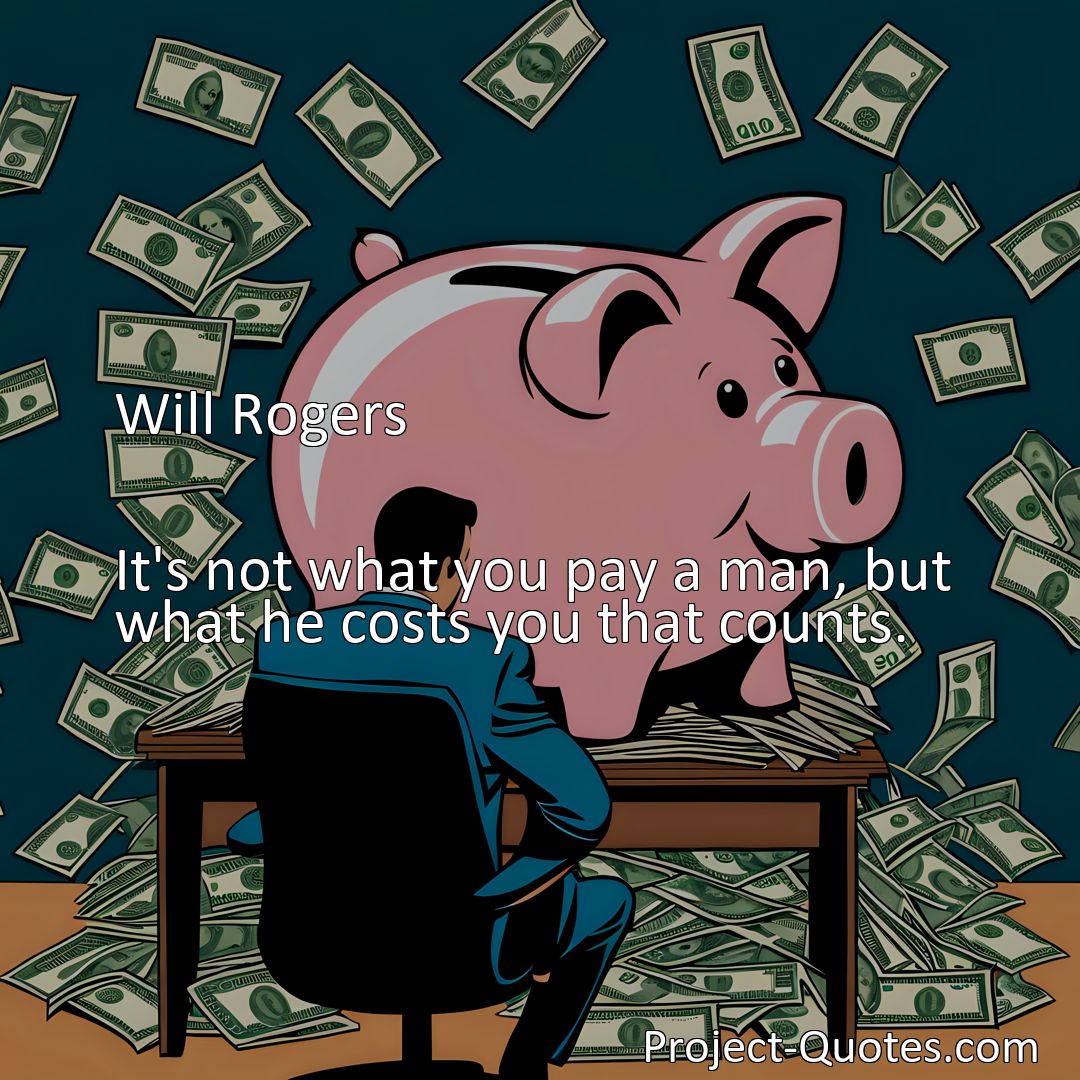It’s not what you pay a man, but what he costs you that counts.
Will Rogers
The True Cost: Evaluating Long-Term Impacts Beyond Price Tags teaches us to look beyond the immediate price tag and consider the hidden expenses and overall consequences associated with our decisions, investments, and relationships. Whether it’s in business, outsourcing, personal relationships, personal development, or societal investments, evaluating the true cost goes beyond financial considerations and allows us to make wiser choices with a more profound impact. Will Rogers reminds us to look at the bigger picture and assess the long-term consequences and value associated with any situation.
Table of Contents
Meaning of Quote – It’s not what you pay a man, but what he costs you that counts.
Have you ever thought about the true value of something beyond its price tag? While it may seem like the cost of an item or service is the most important factor, American business tycoon Will Rogers once famously said, “It’s not what you pay a man, but what he costs you that counts.” This thought-provoking quote challenges us to consider the hidden expenses and overall consequences associated with decisions, investments, and relationships, highlighting the significance of evaluating long-term impacts rather than focusing solely on immediate expenses.
When it comes to paying someone for their work, it is easy to fixate on the hourly wage or the negotiated price. However, Rogers suggests that what ultimately matters is the evaluation of what a person costs you in relation to the value they bring. In other words, it is crucial to assess the long-term benefits and drawbacks associated with any transaction, whether it involves hiring employees, outsourcing services, or even investing in personal relationships.
Reflecting on this quote provides an opportunity to delve deeper into various aspects of life where its implications can be applied. Let’s explore a few scenarios where the true cost of something extends beyond the initial investment.
In the business world, this quote holds particular relevance. Employers often encounter the dilemma of hiring employees who may be highly skilled but demanding higher salaries. Instead of fixating solely on the immediate price tag, business owners should consider the value that these skilled individuals would bring to their organization. A competent employee who contributes innovative ideas, improves efficiency, and boosts overall productivity may be more cost-effective in the long run, despite requiring a higher salary.
Furthermore, the quote can also be applied to the broader sphere of outsourcing services. When businesses decide to outsource, they often aim to minimize immediate expenses by transferring certain responsibilities to external service providers. However, outsourcing carries underlying costs that go beyond the direct financial implications. There may be quality control concerns, communication challenges, and even the potential loss of brand value that should be taken into account. Consequently, determining the true cost of outsourcing requires careful consideration of the long-term consequences it may have on the business’s reputation and overall performance.
Moving beyond the realm of economics, Rogers’ quote can also be applied to personal relationships. Friendships, for instance, are not solely about the monetary cost of shared activities, but more so about the emotional and psychological costs involved. Healthy relationships require time, effort, and sometimes sacrifices. While these costs can’t be quantified with numbers, neglecting them may lead to strained friendships or feelings of isolation.
Similarly, familial bonds also adhere to this concept. Raising a child, for instance, is an enormous responsibility that goes beyond financial expenditure. The true cost lies in the emotional investment, the sacrifices made, and the countless hours spent on nurturing, guiding, and supporting the child. Parents understand that what they pay in terms of energy, time, and attention is what truly counts in the intricate process of raising a child.
In addition to personal relationships, the quote can be applied to personal development as well. Pursuing education or acquiring new skills may require significant financial investments, such as tuition fees, training costs, or purchase of learning materials. However, the true cost is not just the upfront payment but also the effort, dedication, and commitment required to succeed in these endeavors. Achievements attained through hard work and perseverance hold far more value than the monetary expenses incurred along the way.
Expanding our understanding of Rogers’ quote can also lead us to consider the broader implications it has on society as a whole. For instance, when governments make decisions about public investments, they often face criticism regarding the immediate financial burden imposed on taxpayers. However, the true cost should be evaluated in terms of the long-term impact and benefits that these investments bring. For instance, funding infrastructure projects may increase initial costs but can lead to job creation, economic growth, and improved quality of life in the long run.
Ultimately, Will Rogers’ quote serves as a gentle reminder to practice holistic thinking and forward planning. The true cost of something encompasses the hidden expenses, the long-term consequences, and the intangible value that may not be immediately apparent. Whether it pertains to business decisions, personal relationships, or societal investments, evaluating the overall cost beyond the initial payment allows us to make wiser choices and have a more profound impact on our lives and the world around us.
In conclusion, “It’s not what you pay a man, but what he costs you that counts” invites us to consider the bigger picture when making decisions. This quote teaches us to assess the long-term consequences, the underlying value, and the hidden expenses associated with any given situation. By embracing this mindset, we can make more informed choices and recognize that a true evaluation of cost extends far beyond immediate financial considerations. So, the next time you find yourself making a decision, remember the words of Will Rogers and evaluate the true cost, for it is what truly counts.
I hope this quote inspired image brings you hope and peace. Share it with someone who needs it today!


